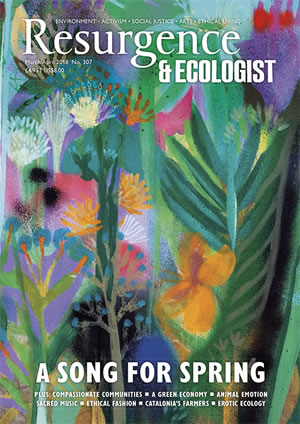On a Saturday, you are likely to find Philip Lymbery, chief executive of the campaigning charity Compassion in World Farming (CIWF), munching on a burger at a cafe in Petersfield, Hampshire, near his home. But not all is as it seems. “It’s quite novel because the products here mimic the food you would find at McDonald’s – Chicken Nuggets, Quarter Pounder with Cheese... They are sold as that, but here they are all plant-based,” he says.
This is the nearest Lymbery says he will get to eating an actual McDonald’s burger, but he has worked closely with the company for the last 10 years with, he says, encouraging results.
“I’ve found them remarkably open to a conversation about change,” he says. “In Britain and western Europe they use only free-range eggs, in the UK all the milk for their hot drinks comes from organically reared cows, and their beef is from grazed cattle. They’ve also made a commitment to go to only cage-free eggs in the United States.”
McDonald’s is one of around 800 food companies CIWF has worked with over the last decade in its mission to end the practice of intensive farming by highlighting the impact on animal welfare, human health and the environment. Most recently, the organisation has warned of another dangerous link: the threat of species extinction.
Lymbery says he made the connection when visiting Boulders Beach, South Africa, while promoting his book Farmageddon, published in 2014.
“I wanted to go and see the African penguins,” he says. “While I was on the beach I saw an interpretation board which said the major threat to the penguins was a reduction in their food supply – pilchards and anchovies, mainly – due to overfishing. I realised from work I’d done in the Pacific looking at the anchovy fishery for factory farms that the reason why the once numerous African penguin is now facing extinction is that we’re hauling huge amounts of these small pelagic fish out of the ocean to grind down for fish meal to feed to industrially reared animals, leaving the penguins – as well as puffins in the northern hemisphere – starving. It was a link that made me ponder how many clear linkages there might be between factory farming, keeping animals caged, cramped and confined, and the demise of iconic wildlife.”
It’s a connection conservationists hardly ever mention, “because they haven’t tried hard enough”, Lymbery says. “I think for some conservationists there has been denial over meat, particularly industrially reared meat, and its effect on the natural environment. Also too many conservationists see the idea of putting farm animals into factory farms as a space-saving idea and thereby leaving room for wildlife. But nothing could be further from the truth, because by putting the animals into those cages what we then have to do is dedicate vast acreages of arable land elsewhere to growing feed for them, which wastes much of the value of the crop in conversion to meat, milk and eggs. To me it’s madness on a plate.”
The discovery led Lymbery to write the book Dead Zone, which took three years to research. Along the way, he and his colleagues realised that from a consumer point of view they needed to find a number of ways to “join the dots for people”.
“People get that putting animals into cages is cruel, but the idea that putting [farm] animals into cages is not only cruel but also leading to the demise of penguins, elephants, jaguars is a much more complicated story to tell,” he says. So the organisation decided to embark on a comprehensive communications campaign involving speaking engagements, an interactive exhibition titled STOPTHEMACHINE, and a two-day conference in London last year.
“We wanted to amplify this message that actually factory farming is one of the major drivers of wildlife decline and we as a green movement need to get on top of this, stop it before it’s too late,” Lymbery recalls.
The conference, Extinction and Livestock, held in partnership with the Worldwide Fund for Nature, was heralded as a landmark event, bringing together a range of people, including conservationists, farmers, human health experts, and representatives from global food companies such as McDonald’s and Tesco, to discuss the impact of intensive farming and how we can move towards a “flourishing food system”.
Debates touched on the impact of factory farming on human rights; the ethics and human health implications of eating animals; deforestation and greenhouse gas emissions; reaching our planetary boundaries; and technical innovations including vat-raised meat and plant-based burgers designed to mimic meat to such an extent that they ‘bleed’ beetroot juice.
Though widely praised for reflecting the wide-reaching damaging effects of intensive farming by bringing together such a huge variety of participants, the conference was also criticised for not providing enough space for attendees to talk about solutions outside the main discussions.
Merisa Thompson wrote on the blog Global Food Justice: “One key question raised, both in my mind, and often by attendees more than speakers, was the extent to which business-focused, corporate and technical fixes – such as plant-based entrepreneurialism – (often promoted as an alternative) can offer real change, as these ‘solutions’ tend to take place within established structures of power rather than challenging them.”
Another of those at the conference, Bella Crowe, policy officer at Nourish Scotland, said: “The potential to really build common cause and stimulate a movement that could work to end the industrial livestock sector was unfortunately not fulfilled.”
She also pointed out that the panels were overwhelmingly composed of white men.
“I think that is fair criticism,” Lymbery reflects, adding, however: “The team who put the conference together were all women. I know they worked very hard to get a greater diversity of speakers. Certainly the feedback that people would have welcomed more networking time in the margins, I think that is very well received. We’ll take that on board for the future.”
So far that future includes a plan to host a conference in Brussels in the European parliament, celebrating the need to diversify protein and reduce our reliance on meat and dairy. CIWF is also working closely with the British government to keep factory farming reforms on the agenda during the Brexit process.
“Some key measures that we’d like to see are an end to live animal exports; the subsidy system redirected to ensure that public money is only given to farmers delivering better animal welfare and practising more environmentally friendly farming; and meat and dairy labelled with information about how they are produced so that consumers can choose humanely reared meat instead of being bamboozled by labels such as ‘farm fresh’ and ‘country fresh’, which often simply mean factory-farm-fresh,” Lymbery says.
In the meantime he is urging the conservation movement “to get behind moves to end industrial farming” in favour of diets based on more plants and less and better meat from pasture-fed free range and organically reared animals.
While not everyone wanting to make a difference will opt for a vegan burger in the style of McDonald’s, the work of Lymbery and his colleagues at Compassion in World Farming is a powerful reinforcement of the urgency of this message.
Dead Zone: Where the Wild Things Were (2017) is published by Bloomsbury.







